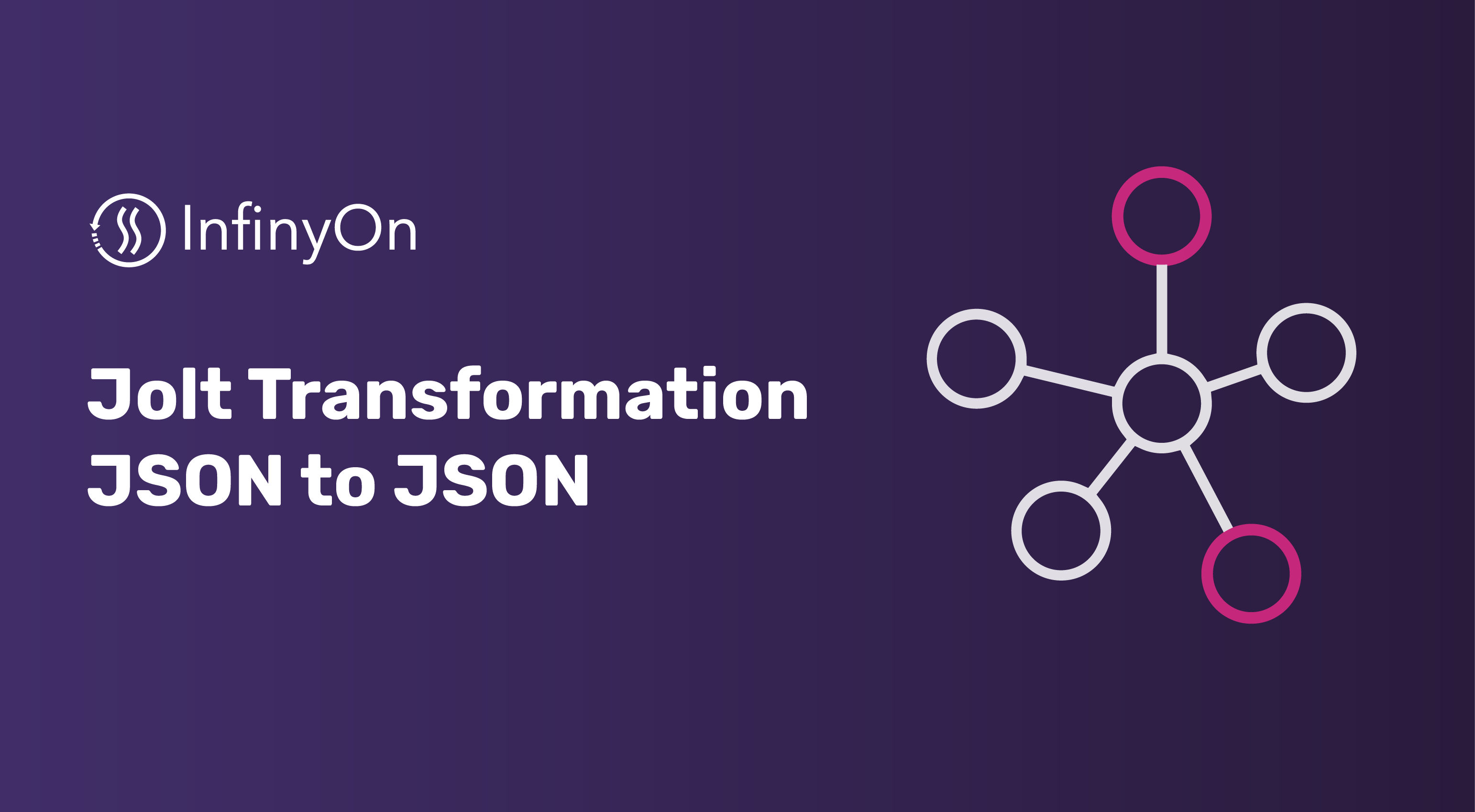Use Cases
Docs
Blog Articles
BlogResources
Pricing
PricingFlexible JSON transformations in Rust
Engineer, InfinyOn
The JSON format remains one of the most popular text data formats for Data-in-Transition. You can encounter JSON data on every stack level of your application: from the database to UI, from IoT sensors data to the mobile app’s payload. And it is not a coincidence; the format has a good balance between being convenient for developers and decent payload density. In Rust ecosystem, the de-facto standard for dealing with JSON is Serde. Although it is the best choice for most cases, there can be alternative approaches that can work best for your application. One of these approaches we are going to cover in this article.
This blog is intended for Rust beginners.
Pre-conditions
In order to properly follow this blog, you need to be familiar with Serde crate and JSON data format.
Scenario: Processing JSON in Rust. The format changes often.
Imagine you are developing a new application that processes a stream of records in JSON format. You are not quite sure what records will look like in the future, but for now, you are currently working with this input:
{
"id": "0000000001",
"key": "09B5C373-CB7F-4E45-9F38-50C1F8F69C5D",
"value": "42883098-74A2-4353-A534-26F533665B67"
}
As part of your application’s dataflow, you need to transform the input into the following output:
{
"key_id": "09B5C373-CB7F-4E45-9F38-50C1F8F69C5D",
"value_id": "42883098-74A2-4353-A534-26F533665B67",
"source": "source_connector_12"
}
So the change is that we remove the id field, we rename key to key_id, value to value_id, and we add the new
source field with fixed value source_connector_12.
Let’s set up a Rust project and see what the code would look like with Serde crate:
$ cargo new json-to-json-serde --lib
Ensure that Cargo.toml has the serde (with the derive feature) and serde_json crates:
serde = { version = "1", features = ["derive"] }
serde_json = "1"
Sample code:
// src/lib.rs
use serde::Deserialize;
use serde::Serialize;
#[derive(Deserialize)]
struct InputRecord {
id: String,
key: String,
value: String,
}
#[derive(Serialize)]
struct OutputRecord {
key_id: String,
value_id: String,
source: String,
}
impl From<InputRecord> for OutputRecord {
fn from(input: InputRecord) -> Self {
let InputRecord { key, value, .. } = input;
Self {
key_id: key,
value_id: value,
source: "source_connector_12".to_string(),
}
}
}
#[cfg(test)]
mod tests {
use super::*;
use serde_json::json;
#[test]
fn it_works() {
let input = json!({
"id": "0000000001",
"key": "09B5C373-CB7F-4E45-9F38-50C1F8F69C5D",
"value": "42883098-74A2-4353-A534-26F533665B67"
});
let input: InputRecord = serde_json::from_value(input).expect("valid input");
let output = OutputRecord::from(input);
assert_eq!(
serde_json::to_value(&output).expect("valid output"),
json!({
"key_id": "09B5C373-CB7F-4E45-9F38-50C1F8F69C5D",
"value_id": "42883098-74A2-4353-A534-26F533665B67",
"source": "source_connector_12"
})
)
}
}
There can also be a solution with an untyped Value type, but it is less convenient for development, hence less popular,
and is not that important for the sake of this scenario.
What is the disadvantage of such a solution? As I said before, you are developing a new application that often implies changes in input and output formats. So, for every change you want to make to your transformation, you must re-compile your code. In real life, it is not just re-compile. The whole new process of CD and CI might need to be passed until the app gets the new flow. Therefore, as a developer of such an application, you might want to have the transformation flexible, meaning that you don’t need to change the code if the structure of the input JSON or output one changes in time.
Fluvio Jolt
We, in Fluvio, decided to port to Rust a Java library Jolt that does exactly what we want here. Meet Fluvio Jolt: JSON to JSON transformation where the “specification” for the transform is itself a JSON document. Since the transformation is dynamic, flexible, and defined by another input, you don’t need to re-compile your application if the structure of your records changes. As we said, the “specification” for the transformation is a JSON document also. Let’s take a look at the specification needed for our case:
[
{
"operation": "shift",
"spec": {
"key": "key_id",
"value": "value_id"
}
},
{
"operation": "default",
"spec": {
"source": "source_connector_12"
}
}
]
We can see there are two operations here. The first one is shift. We say which fields we want to move to and where.
The second operation is default. We define a new value for the field if it is not present. The delete operation is
also available, but these two operations cover all we need.
Once we have the spec, we are ready to transform.
Let’s set up another Rust project with Fluvio Jolt:
$ cargo new json-to-json-jolt --lib
Add fluvio-jolt crate to Cargo.toml:
fluvio-jolt = "0.1"
serde_json = "1"
The code will be similar to this (notice that we don’t need to define new types):
// src/lib.rs
#[cfg(test)]
mod tests {
use fluvio_jolt::TransformSpec;
use serde_json::json;
#[test]
fn it_works() {
let spec: TransformSpec = serde_json::from_str(
r#"
[
{
"operation": "shift",
"spec": {
"key": "key_id",
"value": "value_id"
}
},
{
"operation": "default",
"spec": {
"source": "source_connector_12"
}
}
]
"#,
).expect("parsed spec");
let input = json!({
"id": "0000000001",
"key": "09B5C373-CB7F-4E45-9F38-50C1F8F69C5D",
"value": "42883098-74A2-4353-A534-26F533665B67"
});
let output = fluvio_jolt::transform(input, &spec);
assert_eq!(
serde_json::to_value(&output).expect("valid output"),
json!({
"key_id": "09B5C373-CB7F-4E45-9F38-50C1F8F69C5D",
"value_id": "42883098-74A2-4353-A534-26F533665B67",
"source": "source_connector_12"
})
)
}
}
Codewise, we only need to parse a string containing all the transformation logic we want, and we are ready to process records.
Conclusion
What does it give you? Now, you have an option to modify the specification in runtime or load it during the startup of your application. You can pass it along with your records or read it from another source. Usecases are limited only by your imagination.
If you find this library helpful, we encourage you to contribute! It is still in the early stage of development, and there are a lot of missing features that can and should be ported from Java’s Jolt.
Please, be sure to join our Discord server if you want to talk to us or have any questions.
Have a happy coding, and stay tuned!

